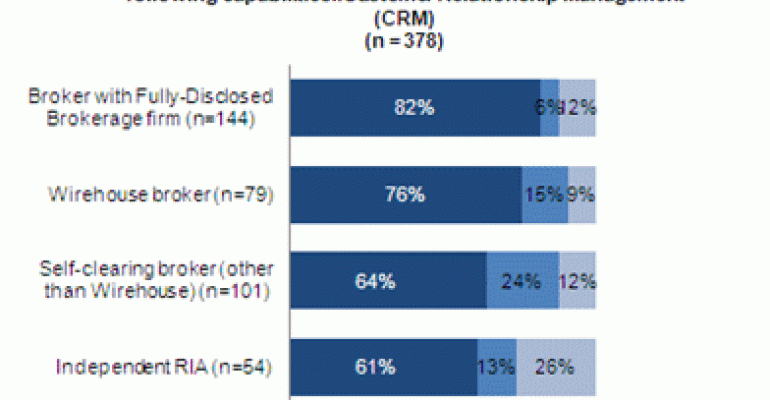Wealth management firms are expected to invest heavily in customer relationship management technology (CRM) over the next three years, according to a new report from Aite Group. The new technology would more efficiently store and manage vast amounts of client information and speed up retrieval of client information by financial advisors and other users at the firms.
And yet, the CRM ramp up will not be without conflict. Some financial advisors resist new CRM technology; many dislike what they say is a steep learning curve and worry they will lose control of client information if they integrate it fully into the firm's network.
CRM spending in North America is estimated to grow by a compounded annual growth rate of 8 percent, from some $460 million in 2010 to $620 million by 2014, according to the report by Aite Group, a Boston-based independent research and advisor firm. (An advanced copy was reviewed exclusively by Registered Rep. ahead of the report's planned publication April 11.)
In a survey of industry CRM usage, Aite noted that brokers at wirehouses and brokerages that clear with third-party firms (called fully-disclosed brokerage firms) had the highest concentration of usage today: 76 percent and 82 percent, respectively. Lowest usage rates were among self-clearing brokers and independent RIAs at 64 percent and 61 percent, respectively. Aite analyst Sophie Schmitt, the report's author, said the breakdown, in part, reflects the bigger technology budgets at the larger firms. At the same time, smaller firms with fewer clients than the largest houses, including independent RIAs, may not need CRM as urgently, she noted. Still, there is a significant number of large and smaller wealth management firms using their own alternatives to industry CRM vendors offerings. Many of these firms manage client contacts and activities through the likes of Microsoft Outlook and Office tools, or through desktop contact management tools, according to Aite.


Today’s CRM “solutions” are a far cry from what they were a decade ago, Aite says. The technology is much easier to use, customer data is simpler to find, analyze, and share among more people simultaneously, and to access from any device. The cost has also dropped, with cheap browser-based technology eclipsing costlier hardware devices, and new “cloud” computing making widespread CRM access easier. And the range of functionality is exploding.
“It’s going to the next level,” Schmitt told Registered Rep., citing, for example, the unified view of customer data, and advanced workflow and calendar tools for FAs. “Reminders can be sent [electronically] to their assistant telling them to schedule this meeting for John Smith,” she said. “It is that kind of intelligence that is going to drive spending.” Schmitt also sees spending picking up among wealth managements firms not currently invested in CRM.
The Aite report contends that advisers are in more need of CRM technology than ever before to help them more effectively manage the increased number of client activities today. “Advisors need to up their game in a post-crisis environment in which clients are more risk averse and seek more control over their investments compared to pre-crisis years,” according to the report. “To avoid losing clients advisors must enhance the level of service they provide while making sure their service model is profitable,” the report added.
Still, even among the firms where CRM solutions are fully available to most advisors, not everyone is a committed user. One big producer in wealth management at Merrill Lynch—which he noted uses the CRM product called Salesforce.com—told Registered Rep. he doesn’t have enough time to master the controls. Like other firms, the CRM is not mandatory. But Merrill is at pains to encourage usage, this FA said. “Merrill is very good at providing back-up CRM training but it takes a lot of time to master the system,” this FA said. “I don’t feel I have the time to concentrate and learn it.” Instead, this FA says he takes a “hybrid” approach, occasionally using his CRM solution but other times transcribing customer notes and saving “substantive e-mails” onto his Outlook system. Merrill Lynch had no comment for this story.
Aite, in its CRM report, notes this same kind of resistance among some FAs.
“Solutions are often viewed as too cumbersome by advisors as they are often required to fill out myriad fields with every client activity record for the purpose of providing management with greater transparency into advisor productivity,” according to Aite.
Aite also noted that many advisors have strong reservations about “relinquishing control” over their client lists and information. “Advisors tend to view clients as theirs and not the property of their firm, and they want to ensure that they can take their clients with them if they leave,” according to Aite.
But the Merrill FA who spoke to Registered Rep. said that sharing client information with the firm was not a major worry for him. “I use Outlook at the firm which it controls, so I am already sharing [client] data,” the FA said, referring to the ability of a company to access data stored on employees company-managed computers. “My handicap, to be honest, is learning the CRM system,” he added.






